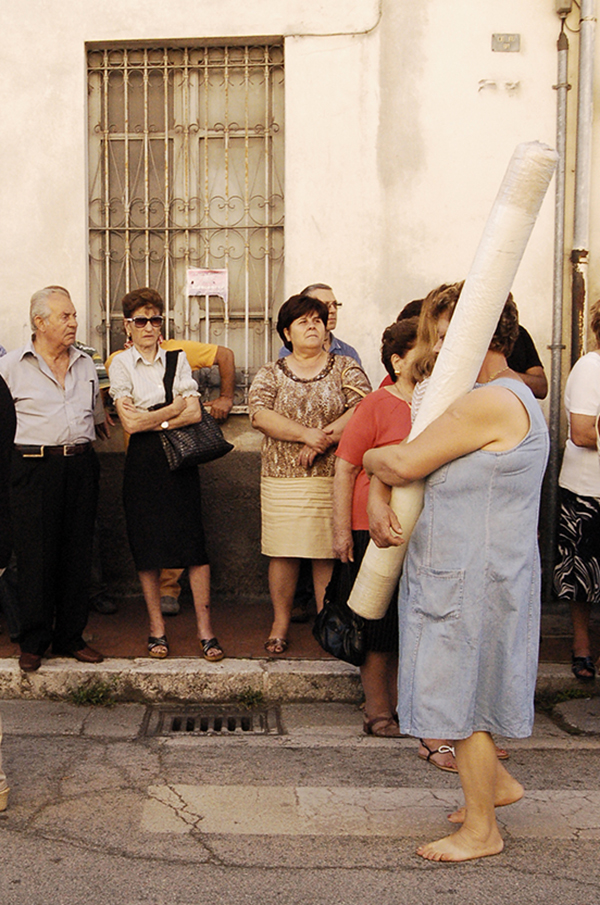DELIRII DI SISIFO SUL TEMA DEL PIACERE

text and image by Paolo Emilio Bellissario
The most solid pleasure in life is the useless pleasure of illusions.(1)
There are painful works, in which labour becomes a pleasure too. Wretched works that can be accomplished admiringly and vile occupations tending to great purposes.(2)
No pain, no gain, “there is no progress without pain.”(3)
We need to make our life as a work of art [...] That’s the real superiority.(4)
They were searching the Supreme, the Unsurpassed, the Unattainable, and came so far away that sometimes, still at the top of oblivion, a dark anxiety took them, like a voice of warning rising from the innermost to warn them of an unknown punishment, of a closer end. By the same tiredness a thinner desire was rising again, bolder, rasher; the more they intoxicate their selves, the more the chimera of their hearts increases, tosses, generates new dreams; they seemed to find their rest in the effort, as the flame finds its life in burning.(5)
The Will gave up the scepter to Instincts; Aesthetics replaced Morality.(6)
“Everyone kills the things they love / some kill love when being young / others when they are old / those who strangle it with passion / and those with gold / The kindest use a knife / to get the corpse a faster cold. / [...] so each man kills the thing he loves / yet no man dies.” (7)
« It’s a bit like the myth of Sisyphus… ».(8)
Hell is not pushing the boulder, but in talking, in nurturing hopes and disappointments, in asking if we would be able to get the boulder up the hill, soon or later. [...] it’s in the idea of life as a struggle, the idea that it should be different than it is. [...] Which understaning could help Sisyphus? [...] Simply to push the boulder without hoping in a different life. [...] If we hold the boulder on our head, then life seems a boulder. Otherwise, life is simply whatever we are doing.(9)
When you have friends to share the pain, the mind can overcome many sufferings.(10)
Il più solido piacere di questa vita è il piacere vano delle illusioni.(1)
Vi sono lavori penosi, in cui pure la fatica diventa piacere. Lavori meschini che possono compiersi nobilmente e vili occupazioni che tendono a grandi scopi.(2)
No pain, no gain: “non c’è progresso senza dolore”.(3)
“Bisogna fare la propria vita come si fa un’opera d’arte […]. La superiorità vera è tutta qui.(4)
Ricercavano senza tregua il Sommo, l’Insuperabile, l’Inarrivabile; e giungevano così oltre, che talvolta una oscura inquietudine li prendeva pur nel colmo dell’oblio, quasi una voce d’ammonimento salisse dal fondo dell’essere loro ad avvertirli d’un ignoto castigo, d’un termine prossimo. Dalla stanchezza medesima il desiderio risorgeva più sottile, più temerario, più imprudente; come più s’inebriavano, la chimera del loro cuore ingigantiva, s’agitava, generava nuovi sogni; parevano non trovar riposo che nello sforzo, come la fiamma non trova la vita che nella combustione.(5)
La volontà aveva ceduto lo scettro agli istinti; il senso estetico aveva sostituito il senso morale.”(6)
“Ciascuno uccide le cose che ama/alcuni uccidono l’amore da giovani/altri quando sono vecchi/chi lo strangola con la passione/e chi con l’oro/i più gentili usano il coltello/ perchè il cadavere si raffreddi prima. [...] così ogni uomo uccide le cose che ama/ eppure nessun uomo muore.”(7)
«E’ un po’ come il mito di Sisifo…».(8)
L’inferno non sta nello spingere il masso, ma nel ricamarci sopra, nell’alimentare idee di speranza e delusione, nel chiederci se prima o poi riusciremo a far rimanere il masso in cima alla collina. [...] è l’idea della vita come lotta, l’idea che debba essere diversa da com’è. [...] Quale potrebbe essere l’illuminazione di Sisifo? [...] Semplicemente spingere il masso senza continuare a sperare che la sua vita sia diversa. [...] Se tratteniamo i massi nella nostra testa, la vita sembra un macigno. Altrimenti, la vita è semplicemente qualunque cosa stiamo facendo”.(9)
Quando nel dolore si hanno compagni che lo condividono, l’animo può superare molte sofferenze.(10)
(1). G.Leopardi – Zibaldone, 51
(2). da “la tempesta” di Shakespeare
(3). un modo dire anglosassone usato per la prima volta da Jane Fonda nei suoi video di aerobica per”casalinghe disperate” famosi negli anni 80
(4). G. D’Annunzio, Il piacere, 1889
(5). G. D’Annunzio, Il piacere, 1889
(6). G. D’Annunzio, Il piacere, 1889
(7). Lysiana (Jeanne Moreau) in “Querelle de Brest” (1982) di Rainer Werner Fassbinder
(8). Timothy Judge, ricercatore e coordinatore dello studio su ambizione e felicità dell’Università di Notre Dame, in E.Di Pasqua “Ambiziosi, intelligenti e affermati Ma a volte infelici” – Corriere della Sera
(9). Niente di speciale. Vivere lo zen di Charlotte Joko Beck (pp. 19-24).
(10). W.Shakespeare
Related Posts :
Category: Article
Views: 2480 Likes: 0
Tags: Artemide , Charlotte Joko Beck , Corriere della Sera , D'Annunzio , emilio , gabriele D'Annunzio , Jane Fonda , Jeanne Moreau , masochism , Notre Dame , paolo , Querelle de Brest , Rainer Werner Fassbinder , Shakespeare , Sisifo , Timothy Judge , W.Shakespeare , William Shakespeare , zibaldone
Comments:
Info:
Info:
Title: DELIRII DI SISIFO SUL TEMA DEL PIACERE
Time: 2 giugno 2012
Category: Article
Views: 2480 Likes: 0
Tags: Artemide , Charlotte Joko Beck , Corriere della Sera , D'Annunzio , emilio , gabriele D'Annunzio , Jane Fonda , Jeanne Moreau , masochism , Notre Dame , paolo , Querelle de Brest , Rainer Werner Fassbinder , Shakespeare , Sisifo , Timothy Judge , W.Shakespeare , William Shakespeare , zibaldone






